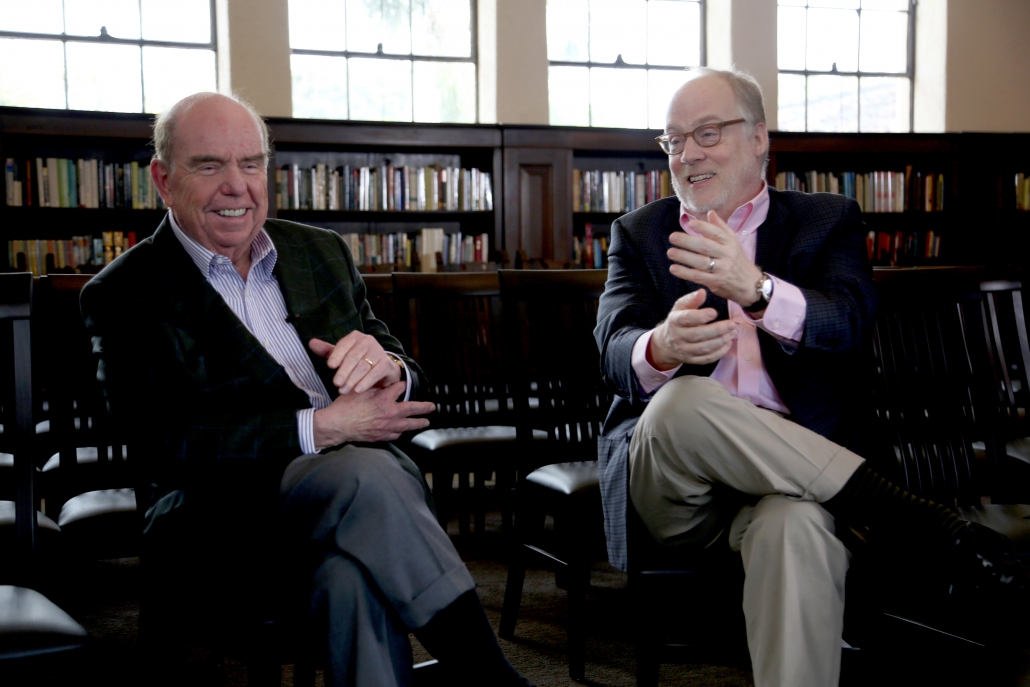Center for the Political Future creates a political podcast

As the 2020 presidential race rolls along, the Dornsife Center for the Political Future has created “Election R&D: 2020 and Beyond,” a political podcast showcasing views from strategists, journalists and politicians aimed at informing students on the candidates, their platforms and the importance of voting.
Hosted by CPF co-directors Robert Shrum and Michael Murphy, the political podcast typically derives from live events put together by the center, which are converted into a podcast that can be accessed online. However, due to the ongoing coronavirus pandemic, the podcast has shifted to hold events virtually.
“We’re creating the schedule as we go now,” Shrum said. “The truth is, if everything had remained normal, we would have turned each of the events that we’ve now had to cancel through the rest of the semester into a podcast. Now, we are beginning to work as hard as we can on finding ways to do this remotely.”
CPF’s most recent event, “Dornsife Dialogues: The Pandemic Election,” took place Thursday over Zoom, where the organization set up a virtual discussion about the impact of the coronavirus on the upcoming presidential election. Though the event will not be converted into a podcast until a later date, Shrum considered the event his favorite addition to “Election R&D.” Both he and Murphy hosted the event, but their roles in the podcast can vary depending on the context of each episode and whether they will be the sole speakers or a moderator among other guests.
The two come from different political backgrounds: Shrum is a Democratic strategist who has served as an adviser to presidential candidates including Al Gore and John Kerry and Murphy has served as a political consultant for Republicans including current Utah Senator Mitt Romney and former California Gov. Arnold Schwarzenegger.
But their contrasting histories are beneficial to the podcast’s goals of facilitating civil and nonpartisan discourse, CPF Executive Director Kambiz Akhavan said.
“Our center is devoted to bipartisan explorations of the biggest issues facing our country and our community and the podcast is a reflection of those conversations,” Akhavan said. “You can hear us in conversation and discussion with many of the top political strategists, elected officials, political journalists and practitioners to help us understand what’s going on in the world from a nonpartisan perspective and show that we can disagree with each other and still be civil.”
As part of the CPF team that put together regular panels and political events with former White House staff and campaign strategists, Shrum and Murphy looked to create an outlet that would allow audiences to listen in even when they cannot attend in person.
“We do get a lot of interest from community members who will drive from miles away and regularly attend our events, which we love, but we’re always wanting to kind of cast a wide net and let more people know about these important discussions that we’re having,” said Erika Maldonado Singh, community engagement manager of CPF.
As one of the podcast producers, Maldonado said the series also allows students to find another outlet to become involved in political conversations. The strong appeal of the medium encouraged the team to use a podcast format for “Election R&D.”
“Podcasts are all the rage right now — everyone has a podcast,” Maldonado said. “So we figured it was just another vehicle to share these important conversations that we’re having.”
A panelist in the Super Tuesday Watch Party, former assistant managing editor of the Los Angeles Times Christina Bellantoni said the podcast is an effective way to reach out to students who are now turning to podcasts to obtain information.
“Students tend to listen to podcasts — I’ve been really surprised, actually,” Bellantoni said. “I listen to podcasts when I have the time in my car, and that’s not very frequently. Students tell me they listen to them all the time. They’re skateboarding around campus and they’re listening to them. They’re at the gym, they’re listening to them. So it’s a growing young audience.”
CPF aired its first episode with Former White House Communications Director Anthony Scaramucci in early January. Since then, the podcast has quickly gained popularity, with nearly 900 downloads across their listening platforms, including Libsyn and TuneIn.
As the audience continues to grow, both Maldonado and Akhvan said the podcast will continue to expand by including topics on climate change and the spread of misinformation through social media platforms, especially amid the coronavirus pandemic.
Despite the circumstances brought about by the coronavirus pandemic and the group having to move political dialogues remotely, Shrum hopes to see continued audience engagement with the podcast.
“Election R&D is our effort to continue to have a dialogue,” Shrum said. “Not just with students, but with a wider community about what’s going on in politics, even in this terrible time.”

